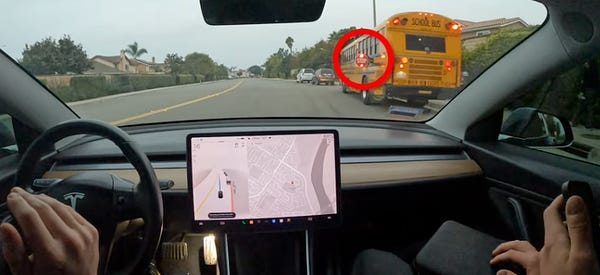Twitter had become a big part of my day. I joined in 2010 to help promote my first book, Carjacked. It became a central site for sharing and promoting my work, but more so for news, research, expression, and dialogue (mostly healthy). Twitter helped me to find amazing teachers to profile in Schooled and to find editors and outlets for my writing. It connected me to a community of transportation, education, and other advocates who have become my teachers, allies, and inspiration.
As for many, Elon Musk’s purchase has me backing off of Twitter in some horror. It’s distressing to see the site deconstructed. There’s no schadenfreude for me in seeing Musk’s terrible business decision-making up close as I lean toward those who argue that acquiring and running Twitter as a business was never the point.
Witnessing his leadership of the site made this recent story about Tesla even more disturbing:


Musk has offered to those Tesla owners who pay more the privilege of beta testing what he calls Full Self-Driving software. (The name is a typical Musk overpromise; it’s not fully autonomous). Verge pointed out that this testing option was previously available only to drivers with a record of safe driving and experience using driver-assist software. Similarly, in the past few weeks, Musk offered Twitter users who pay more the privilege of a blue checkmark, something that in the past required verification of identity as a reliability and safety measure for users.
That hasty Twitter move was an immediate disaster, of course, as a wave of trolls demonstrated how dangerous it is to remove safety protocols from information superhighway infrastructure. This was entirely predictable to the average Twitter user, but appeared to surprise Musk.
We’ve seen Musk test other ill-formed ideas in full view on Twitter — often using such obviously flawed processes as laughably unreliable polls to make splashy and harmful moves — such as returning to the site known purveyors of hate speech, harassment, disinformation, and insurrection.
Can we predict then the danger of Tesla’s Full Self-Driving to road users?
The Dawn Project is focused on ensuring that safety-critical software is actually safe. Based on what they found in testing Tesla’s current Full Self-Driving software, we may reasonably fear some of the most vulnerable, including schoolchildren, to be endangered by Musk’s decision:
Tesla Full Self-Driving will repeatedly drive around stopped school buses with their stop sign arm extended and lights flashing, even when children are getting on or off the school bus.
The Dawn Project’s testing also found that Tesla Full Self-Driving does not identify variable school zone speed limits, and does not slow down to the correct speed limit when children are present.
The question is often asked: is Musk’s behavior a mark of incompetence or willful destruction? A recent New York Times piece highlights how much of his recent behavior (such as firing swaths of employees in sometimes unnecessarily cruel ways) is a through line to his rise in business.
Despite my past study of car culture, I have to admit to not having followed Musk and Tesla closely over the years. I can, however, recommend Edward Niedermayer’s Ludicrous: The Unvarnished Story of Tesla Motors, which I’ve just started. I picked it up after reading an interview earlier this year with Current Affairs in which Niedermayer discussed the company’s history of misleading, overpromising, and lying:
I’m not convinced that Tesla would be here today if it weren’t for the fraud. I think that the fraud has been fundamental to the company’s success…My concern is that if my theory is correct (there’s a lot of evidence, and this is what the book in a lot of ways was trying to prove), if Tesla keeps getting into trouble, and they keep having to do these very shady things to get out of that trouble…
Those looking for what could restrain Musk’s worst impulses vis-à-vis Twitter point to stricter European regulations around hate speech, disinformation, and data protection. The US can and should bolster regulation to better protect its consumers and citizens from social media company failures.
A qualified hope is provided by a look at American car system, where we have a long history of under-regulation and of privileging the profit-makers and their paying customers over the more vulnerable, like children that get on and off of school buses every day. Under-regulation of vehicles continues into the autonomous age. Europe, where crash tests evaluate harm not just to vehicle occupants but to pedestrians, again shows there is another way. And that way is possible: the US also has a long history of meaningful wins by advocates (such as Mothers Against Drunk Driving and the Center for Auto Safety) who pushed for laws that greatly reduced vehicle injuries and deaths.
All of us who use social media and use the roads have a stake here, but the most vulnerable citizens in each case have the most to lose. Protecting the most vulnerable won’t be accomplished by a simple boycott of a particular app or a particular car; it requires advocating hard for meaningful regulation, whether of the internet or the interstate. Otherwise we resign ourselves to being a nation made for men like Musk.





